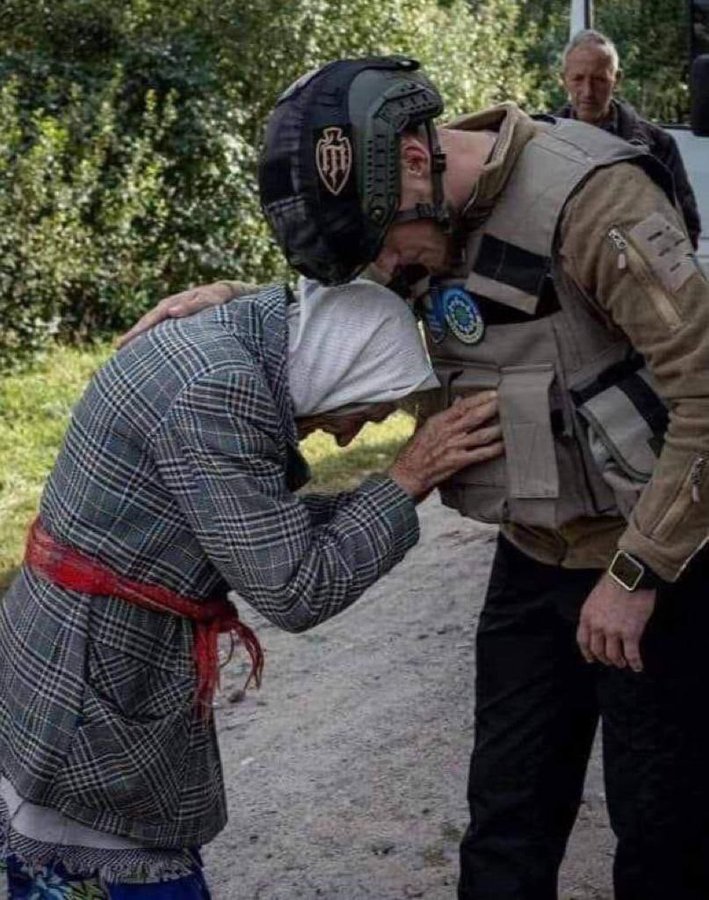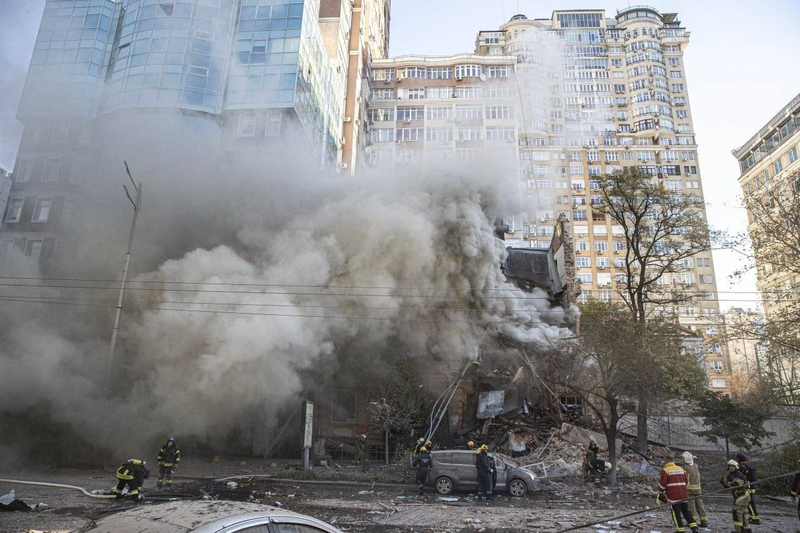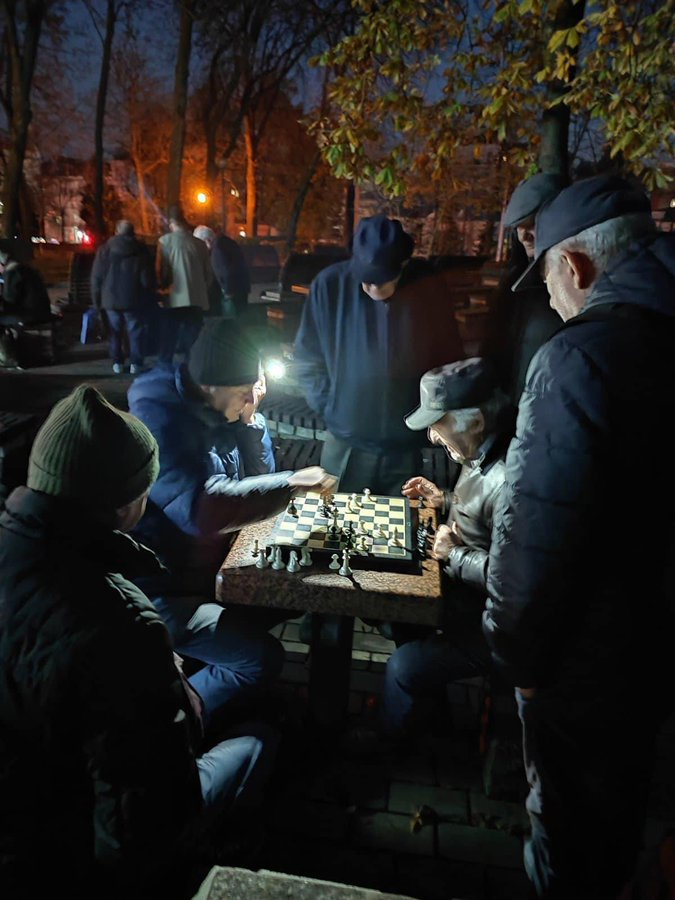Now Ukraine continues to succesfully regain occupied territories Putin seems willing to negotiate. In the West the clamour of 'peacemakers' also is growing. But as long as Putin denies Ukraïne's existence there is nothing to talk about, says Ukrainian political commentator Mykola Riabchuk. Ukraine will continue to fight to completely restore its territorial integrity.
 Liberation in Ukraine (picture from september, ngo World Central Kitchen)
Liberation in Ukraine (picture from september, ngo World Central Kitchen)
The continued advance of Ukrainian armed forces on the Russia-occupied territories, marked by a recent takeover of the strategically and symbolically important city of Kherson, emboldened Ukraine supporters who demand more aid for the beleaguered country and believe that its victory, i.e., full recapture of lost territories, is increasingly feasible. On the other hand, yet, the Ukrainian advance further unnerves the sceptics who have never got rid of their pinky idea of a 'negotiated solution' to the war in Ukraine as the only possible way out.
The optimists draw their arguments on a (perhaps naïve) belief in international law, solidarity, commitment to the professed liberal-democratic values (freedom, dignity and sovereignty in particular), and increasingly on Ukraine’s resilience, civic unity and patriotic determination to wage the national liberation war as long as necessary.
The sceptics’ arguments greatly vary – from the initial disbelief in the capacity of Ukraine’s statehood and national unity, to more substantiated warnings on the inevitable 'Ukraine fatigue' at the prospect of an energy crisis and economic hardships, and ultimately to the apocalyptic vision of a nuclear Armageddon that Ukrainians may 'provoke' by unreasonable attempts to defend their sovereignty.
While Western 'Ukraine fatigue' and Russian nuclear blackmail indeed are serious problems for further discussion, it is interesting to realise what are the alternatives to these gloomy scenarios. In other words, how that coveted 'diplomatic solution' can be viably outlined and realistically implemented?
So far, there is no lack of calls for 'peace negotiations' but very few if any concrete proposals of possible compromises that could be acceptable for both sides. (It seems that besides the erratic billionaire Elon Musk and several other international mavericks of his kind nobody even dares to detail such projects). The reason is simple. If the ultimate goal for Ukraine in this war is to defend its legitimate, internationally recognized borders and protect sovereignty, freedom, dignity and identity of its citizens, how to reconcile it with the ultimate goal of Russia – to abolish international law, to occupy Ukrainian territory, eradicate Ukrainian identity, exterminate the Ukrainian elite as mythical 'Nazis', and to transform the remaining free citizens of the democratic nation into the voiceless slaves of a fascistoid despot?
What is the viable center between these two projects where liberal Kyiv and totalitarian Moscow can compromise?
War on status and identity
The classical peacemaking templates are not applicable here. This war is not about territory – since 2014 Russia occupied Crimea and part of the Donbas, but was not satisfied. It is not about security and the proverbial 'NATO threat': since 2012 Ukraine officially was a neutral (‘non-alligned’) country, like Finland, or the Baltic states, or Afghanistan by the time the Soviets invaded them. And it is certainly not about the mythical 'Nazis' and 'oppressed' Russophones. On the contrary: Russophones are, in fact, the primary victims of Putin’s shelling today, while the 'Nazis', in 2019, elected an (initially) pacifist and cosmopolitan, Russian-speaking Jew Zelensky who replaced his allegedly 'ultra-nationalist' predecessor Poroshenko after free and fair elections.
The war is first and foremost about status and identity. Russia fights the collective West, of which Ukraine is believed to be just a proxy; it fights for an equal status with the U.S. – a status Russia thinks it is entitled to (with its duly assigned spheres of influence) but is unjustly denied; Russia fights for a new world order where might makes right and brutal force and nuclear blackmail reigns supreme.
This is also a war about identity – about the perverse, paranoid, megalomaniac idea of 'Russianness' that originated from the 18th century and became embedded in culture, mentality, and imperial politics. Putin did not invent anything new, but merely developed that old ideology to its extreme, wrapped in jingoistic rhetoric, and ultimately translated into genocidal practices.
Ukraine had the bad luck to be in the center of that idée fixe, of Putin’s obsession. Russian imperial identity was created in the 18th century on the blatant appropriation of the history of Kyiv Rus, the territory of Ruthenia and the identity of Ukrainians and Belarusians by a marginal Moscow tsardom at the north-eastern outskirts of historical Rus. It certainly had some dynastic, ecclesiastic and other connections with Kyiv but the equation of 18th-century Muscovy with the medieval Kyivan Rus polity that disappeared in 1240 is nearly as nonsensical as the equation of modern Romania with ancient Rome.
As Ukraine remained a dangerous witness of that historical theft, an unsurmountable obstacle in the smooth appropriation of the Rus legacy, it was indeed an alien body in an otherwise wonderful mythical picture. That nuisance should be definitely absorbed, digested – or destroyed.
One need not to be much of a specialist on Russia, Ukraine, or Slavonic history – it is sufficient to read Putin’s quasi-historical treatises, or listen to the venomous statements of his ideologists who angrily deny Ukraine’s existence, i.e., its right to exist. That makes one understand both the underlying motives of the Russian aggression and its ultimate genocidal goal – to wipe Ukraine from the earth as state and nation.
In this perverted imagination Ukraine is proclaimed the 'anti-Russia', an existential threat doomed to annihilation
In Putin’s Mein Kampf Ukrainians simply are Russians who forgot who they were, and thus should be forcibly brought back to the Russian fold, whether they like it or not. Pliable subjects should be embraced and rewarded, the defiant 're-educated', and the resistant species exterminated as incurable 'nationalists'or 'Nazis'. In this perverted imagination Ukraine is proclaimed the 'anti-Russia' – an existential threat both to Russian identity and the Russian state. Therefore it is doomed to annihilation.
Make peace is help Ukraine win
Neither putinists’ words nor deeds leave any doubts on their intentions vis-à-vis Ukraine, and Ukrainians are perfectly aware of this. Hence nobody takes 'negotiated solutions' seriously. But the Western 'peacemakers' still propose these unspecified 'solutions', failing apparently to recognize the level of Putin’s obsession with the 'Ukrainian question' – nearly as paranoid as Hitler’s obsession with Jews. In both cases, we perfectly know what the 'final solution' means.
 In October 2022 the Russians renewed air raids on Kyiv and other cities
In October 2022 the Russians renewed air raids on Kyiv and other cities
Hence, the primary question that Western 'peacemakers' should clearly ask is about the Führer’s ideological obsession: is Putin able and willing to renege on his 'Ukraine denial', the root cause of his genocidal rhetoric and genocidal war? Until and unless this happens (and it will certainly not), all 'diplomatic solutions' are wishful thinking that indicate either speaker's belief in miracles or a frantic search for a gentle way to abandon Ukraine and wash off their hands.
But even if abandoned by partners, Ukrainians would continue to fight. What the Western peacemakers are likely to achieve in Ukraine by withdrawing their aid is not the coveted 'peace' but more Russian terror all over the country and more mass graves like in Bucha, Izium, Mariupol and elsewhere.
Is Putin able and willing to renege on his 'Ukraine denial', the root cause of his genocidal rhetoric and genocidal war? No.
The only way to make peace in Ukraine is to help Ukraine win. This might be a challenge, as the sceptics rightly point out. 'Ukraine fatigue' is a real threat but it is up to the Western elite, to political leaders to communicate to their people what the war is about, what is really at stake in historical and international terms, and how minor are the inconveniences that Europeans experience vis-à-vis the ordeals that Ukrainians go through for the sake of what they believe are common values, common security, and a common future.
The nuclear blackmail is a more complicated issue since nobody can provide a hundred-percent guarantee that the besieged Russian forces in the Crimea would not employ a so-called 'tactical' nuclear weapon as the last resort. But this, again, is a matter of communication: how clearly and persuasively the Western leaders will explain Putin the direst consequences of his recklessness.
Putin looks psychopathic but not suicidal, – suffice to remember his panic reaction to covid and his excessive, really caricatural protection measures. Besieged Crimea is actually not a besieged Moscow. In any case, there is no better alternative to countering nuclear blackmail. If we succumb to the blackmailer today, we will create a dangerous precedent for the future. We send a signal to all rogue states that aggression pays off, war crimes go unpunished, and nuclear saber-rattling can have effect. By giving in to the blackmailer we do not solve the problem but postpone and multiply it.
 After elimination of energy systems in Kyiv people keep playing chess in parks in the dark (picture twitter)
After elimination of energy systems in Kyiv people keep playing chess in parks in the dark (picture twitter)
The sad truth that all peacemakers should realize is that Russia is ruled by a rogue regime, that can neither be talked to nor trusted. It means no reasonable negotiations are possible until the regime changes. This may not happen soon, but Ukrainians are determined to defend their country, their freedom and dignity as long as it takes, and it would be neither morally fair nor politically wise to discourage them from resistance.
As UN secretary-general Antonio Gutteres has reiterated recently, we must support peace but 'not any kind of peace – peace based on the values of the UN Charter, and peace based on international law'.
